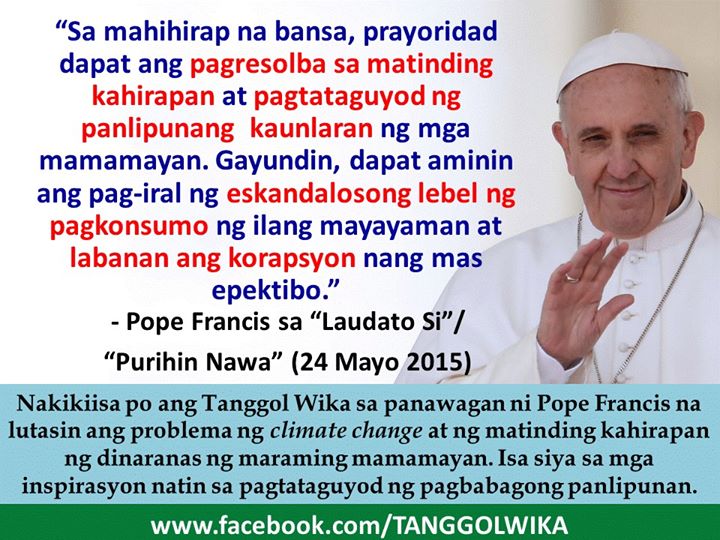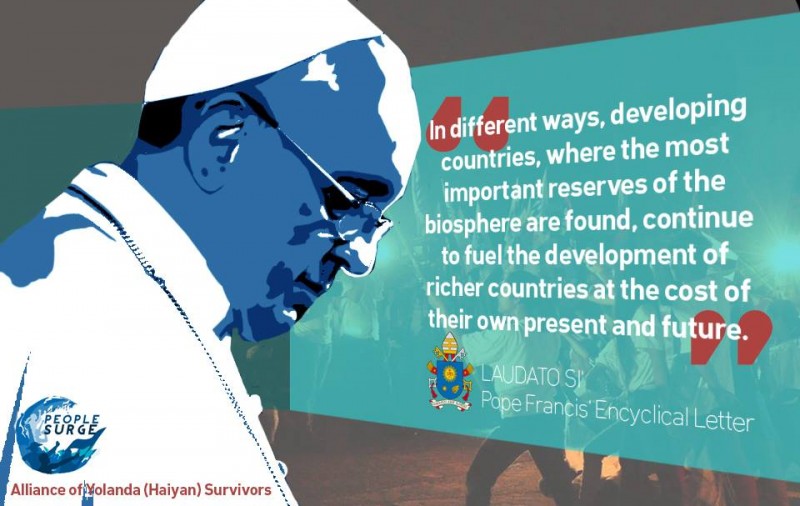The icon ‘Jesus of Creation’ was made by a Filipino Catholic priest in response to the publication of Pope Francis’ encyclical on the environment titled ‘Laudato Si’. Photo from website of Catholic Bishops’ Conference of the Philippines
Environmentalists, activists, and Catholic Church leaders in the Philippines are celebrating the publication of Pope Francis’ 200-page encyclical on the current ecological crisis titled “Laudato Si” (Praise Be). They lauded the pope for tackling climate change and the need to help poor nations, which are vulnerable to the harsh impact of extreme weather events.
The Philippines is the only Catholic-dominated nation in Asia aside from Timor-Leste. Last January, Pope Francis visited the Philippines and interacted with those who survived Typhoon Haiyan (known as Yolanda in the Philippines). Haiyan was the strongest typhoon in recorded history, which killed more than 6,000 people in the central part of the Philippines in 2013.
The encyclical was eagerly awaited by many who wanted to know the views of the pope on the climate debate. After the public release of the encyclical last week, environmentalists quickly commended the pope for promoting renewable energy and for highlighting the dirty and unsustainable conditions of the world’s major economies. Below are quotes from the official Twitter page of the pope which summarized some of the key points of the encyclical:
The earth, our home, is beginning to look more and more like an immense pile of filth.
— Pope Francis (@Pontifex) June 18, 2015
A true “ecological debt” exists, particularly between the global north and south.
— Pope Francis (@Pontifex) June 18, 2015
We have to hear both the cry of the earth and the cry of the poor. #LaudatoSi
— Pope Francis (@Pontifex) June 18, 2015
Referring to the pollution of the seas, Pope Francis quoted a line from a pastoral letter issued by Catholic bishops in the Philippines in 1988:
Who turned the wonderworld of the seas into underwater cemeteries bereft of colour and life?
The original quote was about the dirty Pasig River in Manila, capital of the Philippines, and the destruction of marine resources across the country:
How can fish swim in running sewers like the Pasig and so many more rivers which we have polluted? Who has turned the wonderworld of the seas into underwater cemeteries bereft of color and life? Imagine: only 5% of our corals are in their pristine state! The blast of dynamite can still be heard on our coastal waters.
Inspired by the encyclical, a Filipino Catholic priest made an icon (see photo above) called ‘Jesus of Creation’. Brother Jaazeal Jakosalem of the Order of Augustinian Recollects placed an ancient script from the Philippines into the icon to describe the beauty of creation. He explained the meaning of this work of art:
…the icon depicts Christ as the Son of the Creator, His Father, who participates in the work of creation, and whose redeeming love transforms all that is made. Besides the Son of the Creator, the icon also has the Poor Man of Assisi at the lower center in a way that calls attention to the message of his canticle where he refers to the sun as brother, to the moon as his sister, and to the earth—symbolized by the plant—as his mother.
Meanwhile, some academics translated a paragraph from the encyclical to remind the people about the link of poverty, governance, and environmental protection:

The translation refers to this quote from the pope’s encyclical: “For poor countries, the priorities must be to eliminate extreme poverty and to promote the social development of their people. At the same time, they need to acknowledge the scandalous level of consumption in some privileged sectors of their population and to combat corruption more effectively.”
The group People Surge, representing Haiyan survivors, supported the message of the pope:
We, the Yolanda (Haiyan) survivors are one with the Holy Father in seeking a “bold cultural revolution” and in demanding the world to hear “both the cry of the earth and the cry of the poor.”
A network of environmentalists, Kalikasan, also supported the pope’s encyclical, but they also urged the Vatican to divest from coal investments:
Coming from a region that has been labeled as among the ‘most vulnerable and least prepared’ to face the impacts of climate change, join us in asking Pope Francis’ leadership in the urgent need to usher in a fossil-fuel free future. We believe that religious institutions, that serve the public good, like the Roman Catholic Church, should divest from fossil fuels. Investing in fossil fuel companies serves to legitimise the current status quo of fossil fuel dependence, which drives climate change, hence fueling a cycle of profound injustice.
Journalist Tonyo Cruz was also impressed by the encyclical and wrote how this document could have a deep social impact:
Whether you’re a conservative or a progressive, a person of faith or an atheist, a climate change skeptic or an activist, the encyclical should really interest you. Not only does it show how Pope Francis views the world and his intellectual depth, but it could be a game-changer in the efforts to curb the climate crisis, which affects the Philippines and the word.
Grassroots environmentalist Rodne Galicha believed the encyclical will inspire the people to push for stronger climate action:
Pope Francis cannot solve the climate crisis alone. His encyclical will be a force to unite people of the world to make collaborative efforts, to ask world leaders… to sign… a strong agreement for climate action.
Agnes Brazal, a professor in a Catholic college, also agreed that local green groups will mobilize in response to the pope’s challenge, but she fears it will also intensify conflict in some areas:
Each diocese the church in the Philippines, in collaboration with other faiths and civil society organizations, can plan to educate and mobilize communities to protect the environment and the threatened resources and species in the area. This without doubt would leave a trail of ecological martyrs.







